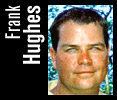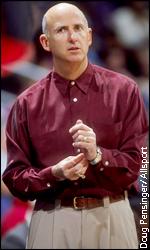
| Tuesday, April 4
By Frank Hughes
Special to ESPN.com |
|
With league attendance sagging to disappointing lows and television
ratings dropping to staggering depths, NBA commissioner David Stern is
considering forming one of the most surprising alliances in professional
sports history, several league sources have told me.
|  | | Falk: Superagent or 1A with the commish? |
Stern, the sources say, is willing to lay aside his differences, his pride
and, some are saying, his values by asking superagent David Falk to quit his
current position and join the NBA in a high-ranking, yet-to-be-determined
capacity, possibly as a sort of co-commissioner.
Goliath would not stand a chance against this two-headed David.
The sources say Stern is willing to lay aside his brittle,
Hatfield-and-McCoy type relationship with Falk -- which has included biting
public comments in recent years, particularly during times of collective
bargaining -- in order to strengthen a league that in many ways is falling
apart at the seams.
"The commissioner believes he (the commissioner) is one of the most shrewd
businessmen in the world," one of the sources with a close relationship with
Stern said. "He also believes David Falk possesses one of the most innovative
minds he has ever seen. The commissioner truly thinks that the combination of
those two assets could make the NBA once again the strongest, best and most
lucrative professional sports league in the world."
Falk, sources close to him say, has been mulling over the offer for
several weeks, but according to the sources is close to accepting Stern's
offer -- with the stipulation that he is not considered Stern's No. 2 -- as
deputy commissioner Russ Granik is -- but that he be considered the NBA 1A,
with as much voting power as Stern holds.
High-ranking league sources also say that Falk's business partner, Curtis
Polk, will be included in the transition, and possibly serve as a "2A" to
Granik.
Falk apparently realized, sources close to him say, that by losing in
collective bargaining two years ago, there really was no more substantial
need for player agents who negotiate contracts, particularly player agents
with his cache, who attract and represent for the most part only the
top-level players, players who will command the maximum salary regardless of
representation.
Falk was deeply disturbed, according to those with knowledge of his
thinking, when Milwaukee Bucks Olympian guard Ray Allen negotiated a contract
on his own behalf, without the help of an agent, because Allen knew he could
keep the agent's percentage for himself.
Those same sources said that Falk was even angrier about the way in which
Lon Babby -- the agent who represents both Tim Duncan and Grant Hill -- has
run his agency, charging by the hour rather than by a percentage.
Both, Falk believes, are the beginning of the end for player agents, and
Falk, sources within his agency say, always has prided himself on staying one
step ahead of both trends and the competition.
Falk also was chagrined, sources who requested anonymity say, when Michael
Jordan recently bowed out of his endorsement deals to concentrate more on his
management of the Washington Wizards and his other investments.
Those endorsements, those anonymous sources indicated, were a good portion
of supplemental income Falk has lost because Jordan's name meant a percentage
of the estimated $40 million Jordan reaps annually.
Falk also took a hit, sources with knowledge of his finances say, when
shoe companies began cutting back on the large number of contracts they had
with star players.
Falk will not be forfeiting the financial base he built with FAME, his own
agency constructed with Polk's help, because he sold it for in excess of $100
million to SPX, the Los Angeles-based megaagency that also has purchased the
company of Arn Tellem.
|
Feedback for Frank
|
|
So what are your thoughts on this column by Frank Hughes? What about some other columns you read on ESPN.com? We want your feedback, good or bad. Click here to e-mail us your thoughts.
|
By relinquishing the rights of the players he currently represents --
which include Alonzo Mourning, Juwan Howard, Patrick Ewing, Dikembe Mutombo,
Maurice Taylor and Elton Brand -- sources within SPX's infrastructure say
that Falk stands to gain another $50 million, a figure that was based on
possible future earnings of Falk's current client list.
In addition, his salary paid by the NBA, one NBA spokesman said, will be
the same as Stern's, which is an estimated $9 million a year.
The $18 million annual salary for its dual commissioners was choked upon
by several owners -- primarily Los Angeles Clippers owner Donald Sterling,
one source who attended a recent Board of Governors meetings said -- but that
billions of dollars are at stake both in television revenue and worldwide
attendance served to assuage most owners' minds of the cost.
Sources within the NBA's upper circle say that Stern, while ceding
bilateral decision-making, envisions Falk networking with players to get a
better idea of in which direction the league would like to head in the new
millennium.
Stern realized his limitations, sources in his inner circle say, when his
idea to place microphones on coaches and place cameras in locker rooms became
such a combustible, combative issue and caused him grave embarrassment.
"The commissioner realizes that because of his (the commissioner's)
stature, there is a natural degree of separation between himself and his
charges, the players," a source who asked his name not be used said. "He
further realizes that David Falk, in his capacity as one of the strongest
harbingers of players' rights, has had an unusually intimate relationship
with most of the more powerful players in the NBA, and as a byproduct of that
social interaction has his finger on the pulse of the league, at least from
the players' aspect of it. The commissioner would like David Falk, as his
first order of business, to use that inherent, invaluable knowledge to take
this league to new and exciting heights."
One possibility, sources with knowledge of developmental leagues say, is
to create a hybrid minor league called the XBA. It would be a combination,
those sources say, of the current Continental Basketball Association (CBA),
the minor league system Stern has been talking about that will attract graduating high school players with no interest in college, and in some unnamed
capacity an element of WWF wresting, similar to the XFL that wrestling
commissioner Vince McMahon has formed and that NBC has agreed to broadcast.
Stern and NBC sports president Dick Ebersol have had discussions, network
sources say, about the possibility of success for such a league, a league
that Falk would help develop.
Of course, all those sources I spoke with could have been playing an April
Fool's Day joke on me.
Frank Hughes covers the NBA for the Tacoma (Wash.) News-Tribune. He is a regular contributor to ESPN.com. |  |

 Fouled Out: Rider, Hakeem and Cuban
Fouled Out: Rider, Hakeem and Cuban Fouled Out: Enough recycled coaches!
Fouled Out: Enough recycled coaches!
